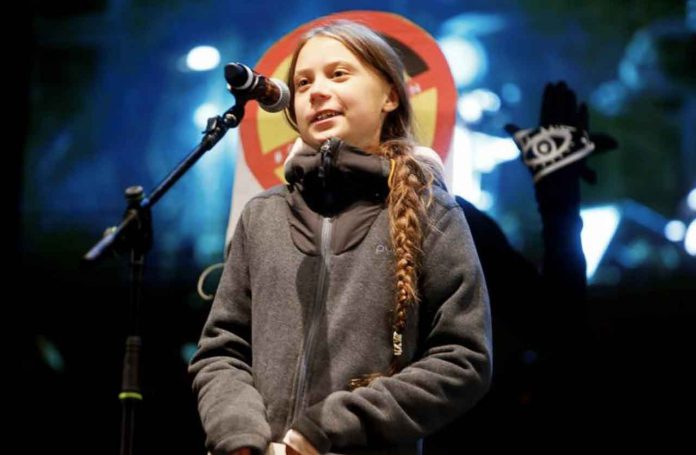
Tracking the Swedish teen activist’s rise from solo climate striker to global campaigner against COVID-19
By Liam Gould and Thin Lei Win
ROME – (Thomson Reuters Foundation) – Climate activist Greta Thunberg this week said she would skip the United Nations climate conference due to be held in Scotland in November over concerns that inequality of access to COVID-19 vaccines will leave many countries unable to attend.
Thunberg shot to fame in 2018 when she began a solitary protest against global warming outside the Swedish parliament in Stockholm, skipping her Friday school classes to demand her government take action on climate change.
Here is a timeline of Thunberg’s rise from a solo climate striker to a global campaigner against COVID-19:
August 20, 2018: Swedish student Thunberg, then aged 15, skips school to protest outside parliament for more action against climate change.
August 26, 2018: She is joined by fellow students, teachers and parents at another protest and begins attracting media attention for her climate campaign.
September 2018: Thunberg begins a regular ‘strike’ from classes every Friday to protest climate issues. She invites other students to join her weekly “Fridays for Future” campaign by staging walkouts at their own schools.
November 2018: More than 17,000 students in 24 countries take part in Friday school strikes. Thunberg begins speaking at high-profile events across Europe, including U.N. climate talks in Poland.
March 2019: Thunberg is nominated for a Nobel Peace Prize. The number of students taking part in school strikes hits more than 2 million people across 135 countries.
May 2019: Thunberg is named one of the world’s most influential people by Time magazine, appearing on its cover. “Now I am speaking to the whole world,” she wrote on Twitter.
July 2019: Conservative and far-right lawmakers urge a boycott of Thunberg’s appearance in the French parliament, mocking her as a “guru of the apocalypse” and a “Nobel prize of fear”.
August 1, 2019: Thunberg hits back at “hate and conspiracy campaigns” after she was described as a “deeply disturbed messiah” leading a “cult” in an opinion column by conservative Australian commentator Andrew Bolt.
August 2019: Thunberg, who refuses to fly, sails from Britain to the United States in a zero-emissions boat to take part in a U.N. climate summit. Meanwhile, the number of climate strikers reaches 3.6 million people across 169 countries.
September 23, 2019: Thunberg delivers a blistering speech to leaders at the U.N. summit, accusing them of having “stolen my dreams and my childhood with your empty words“.
September 25, 2019: Thunberg is named as one of four winners of the 2019 Right Livelihood Award, known as Sweden’s alternative Nobel Prize.
October 4, 2019: Thunberg denounces the New York climate talks as “a failure” but urges supporters to keep pushing for change at a climate strike in Iowa.
October 11, 2019: Despite being bookies’ favourite to win, Thunberg misses out of the Nobel Peace Prize which goes to Ethiopian Prime Minister Abiy Ahmed.
November 2019: Caught out by a last-minute switch of location for U.N. climate talks from Chile to Spain, Thunberg hitches a ride on a catamaran boat crossing back to Europe.
December 11, 2019: Thunberg denounces “clever accounting and creative PR” to mask a lack of real action on climate change in a speech at the U.N. COP25 summit as the 16-year-old became the youngest individual to be Time Magazine’s person of the year.
March 13, 2020: As governments limit or ban mass gatherings to stem the spread of the new coronavirus, Thunberg urges students to make week 82 of the school strike digital, with the hashtag #ClimateStrikeOnline.
March 24, 2020: Thunberg says the swift measures brought in to stem the coronavirus pandemic show that the world can also take the rapid action needed to curb climate change. She also says on social media that she may have caught COVID-19.
April 22, 2020: Thunberg says the 50th anniversary of Earth Day is the time to choose “a new way forward” and tackle the coronavirus and climate change at the same time.
April 30, 2020: Thunberg donates a $100,000 award she received to UNICEF to buy soap, masks and gloves to protect children from the coronavirus pandemic.
June 5, 2020: Thunberg and Fridays For Future launch a crowdfunding campaign to help communities in Brazil’s Amazon rainforest during the COVID-19 crisis.
July 14, 2020: Thunberg joins others in calling for a repeal of the Philippines’ new Terror Law which she said threaten environmental and climate activists in the country.
July 20, 2020: Thunberg wins the first Gulbenkian Prize for Humanity and donates the 1 million euro prize money to charitable organisations.
January 31, 2021: Thunberg is again nominated for the Nobel Peace Prize, along with Russian dissident Alexei Navalny, the World Health Organization.
April 9, 2021: The activist announces she will not attend COP26 in Glasgow, due to run Nov. 1-12, because of concerns over vaccine inequality.
April 13, 2021: The British Broadcasting Corporation airs a documentary series about Thunberg and her climate activism, featuring British broadcaster and naturalist David Attenborough.
This article was updated on April 13, 2021 to include Thunberg’s announcement that she would not attend the U.N. climate conference.
(Reporting By Thin Lei Win @thinink and Liam Gould, Editing by Tom Finn. Please credit the Thomson Reuters Foundation






